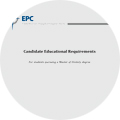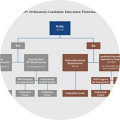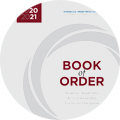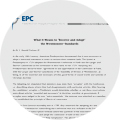EPC ORDINATION QUALIFICATIONS
The qualifications and process below are for those individuals who are not ordained ministers. If you are an ordained minister, see Transferring into the EPC.
THE OFFICE OF MINISTER
Individuals who fill this office should, according to Scripture, meet certain qualifications. They should be sound in the faith and have an aptitude for teaching. Their lives should reflect holiness and discipline that brings honor to Christ and which causes them to be well regarded by those outside the church. They should have wisdom, discretion, and adequate training to equip them for their task. (EPC Book of Government 10.2).
Assuming that the individual meets the biblical qualifications and has an inner sense of call, the process for becoming an ordained minister in the EPC involves:
• Being a member of an EPC congregation for at least six months.
• Receiving Session endorsement as a person called to be a minister of the Word.
• Applying to and interviewing with the appropriate presbytery committee (Candidate Care or Ministerial).
• Being examined by presbytery and approved as a Candidate Under Care.
• Being under care of presbytery for a period of time (ordinarily a minimum of one year).
• Master of Divinity degree, which includes the courses listed in the Ordination Candidate Educational Requirements below.
• Successful completion of written examinations in English Bible; Theology, Sacraments, and Reformed Tradition; Polity; and Biblical Hebrew and Greek Exegesis.
• Successful completion of oral examinations in all the areas above, plus Christian experience of the saving grace of God in Jesus Christ, and progress in spiritual growth.
• Receiving an approved call.
In general terms, EPC ministers are expected to hold a high view of Scripture and be able to “receive and adopt the system of doctrine contained in the Westminster Confession of Faith and Catechisms of this Church as containing the system of doctrine taught in Holy Scripture.” Those seeking ordination in the EPC must put in writing any exceptions they may have to the Westminster standards. The ordination candidate’s presbytery will then vote to either disallow the exception, or allow if the candidate’s exception(s) is/are not considered affecting the Confession’s system of doctrine.
HELPFUL RESOURCES
Book of Order
The current Book of Order contains Rules for Assembly, Acts of Assembly, and Forms for Discipline as amended through the 44th General Assembly (2024). To navigate the volume online, use the bookmarks panel on the PDF.
A spiral-bound printed edition will be available for order soon at www.epcresources.org.
The written examination study guides below are designed to help candidates for ordination meet the requirements in the EPC Book of Government, Section 13-2 (candidates for ordination must successfully complete four written ordination exams: English Bible; Theology, Sacraments, and Reformed Tradition; Polity; and Biblical Hebrew and Greek Exegesis).
English Bible Practice Exams
Click the image above for practice exams that are good tools to diagnose content areas that need additional study
Written Ordination Examination Study Guide
Theology
Sacraments
Reformed Tradition
Biblical Languages Exegesis Examination Instructions
Scripture passage for exam is selected by the Ministerial Vocation Commitee
Office of the General Assembly
5850 T.G. Lee Blvd., Suite 510
Orlando, FL 32822
(407) 930-4239
(407) 930-4247 fax
info@epc.org











